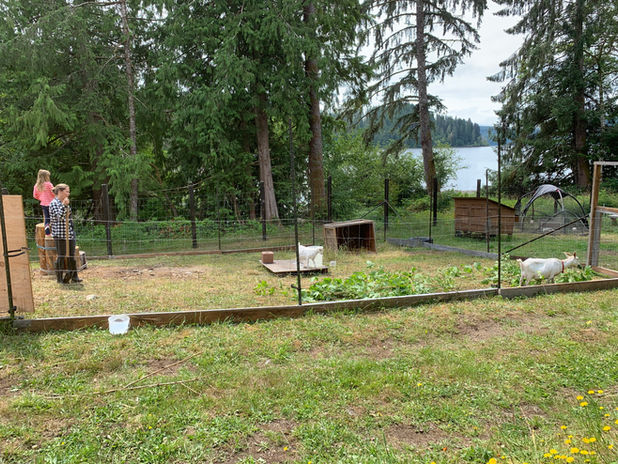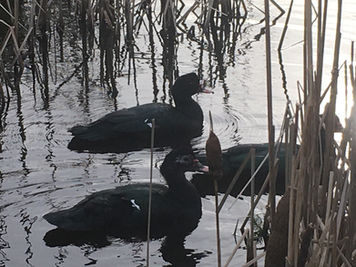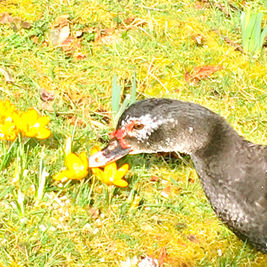
Homesteading and Sustainable Living
on Northern Vancouver Island
Nigerian Dwarf Goats
Our first introduction with raising goats started in June of 2019. It had long been my dream to raise goats and once the perimeter fence was up, I thought it was time. My dad and I built a quick barn and fenced off a small area for Pickles and and her kid Laina, who was 7 weeks old at the time. How adorable! They were snow white with blue eyes.
By the end of July, we wanted to add to the herd, so we picked up Chutney and her two kids Billy Bert and Susan. Goats are really social animals and they love to be together. A group of goats is called a 'trip'.
Nigerian Dwarf goats are smaller in size and are a mulit-purpose breed. I had tried to hand milk Pickles for about a week, but it was an unpleasant experience for both of us, so I stopped. We use the goats right now for land clearing, they do an amazing job at taking down brush plants like blackberry and salmonberry.
A challenge through our first winter was feeding the goats because the plants lose their leaves the dormant season. So we had to buy text grains, alfalfa pellets and orchard grass bales down island. Goats are ruminants, animals with a four-compartment stomach, as are cattle, sheep and deer. The microbial digestion in the reticulo-rumen allows ruminants to consume and utilize grass, hay, leaves and browse. Unfortunately we lost our goat Billy Bert in January, likely due to him eating moldy hay and getting a nasty bacteria in his stomach. It was really sad.
Animal husbandry (looking after animals) is a lot of work and they require a lot of care. We are constantly thinking of food, feeding twice a day, their protection from predators, trimming their hooves every 3 months, thinking about external parasites like lice and internal parasites like worms. Although the goats are an obligation at the farm, I sure do enjoy them! They are fun to watch and most of them are fairly friendly.
DID YOU KNOW GOATS HAVE RECTANGULAR EYES? IT ALLOWS THEM TO SEE 320 DEGREES AROUND THEIR HEAD!
Icelandic Sheep
The sheep came to us at the end of April when the lambs were only 5 days old. We got them from a an Icelandic Sheep breeder in Oyster River. The ewe (female sheep) had given birth to twins, but she only accepted the male lamb. The female lamb was rejected, so she had to be bottle fed. We named the ewe Louise, the boy lamb Larry and the female lamb Luna.
The sheep are a multi-purpose breed. They can be milked, shorn for fibre or butchered for meat. Icelandic sheep are known to be very hardy and easy to raise. It has been amazing to watch the lambs grow! They were so tiny, but put on weight quickly and their horns grow very fast. The horn grow from connective tissue in their skull, so they are actually attached to their heads. Larry has very unique white markings which run all the way through the fur and horns.
The sheep have been great grass trimmers. We provide them with grains and orchard grass as well, but they love to mow our lawn!
** UPDATE - The female lamb had to be put down in early February when she got sick and was not thriving. The ewe and her son were harvested in mid-February for meat.
Chickens
We have been raising chickens for a few years, now, I always find then fun and entertaining. I don't have names for them, they aren't pets, but they do provide daily eggs and meat for us. The brown ones are a Rhode Island Red breed and the white ones are Leghorns. We have one rooster that keeps the flock safe and the eggs fertilized. We have hatched eggs both with an incubator and under a broody hen and raised chicks as well.
The chickens are fed laying pellets and hen scratch (corn mixture) and they love looking for bugs in their free range pasture. We have an automatic chicken door that opens and closes with daylight hours.
Ducks
We welcomed three gorgeous muscovy ducks to the farm in February and we love them! Their names are Pecka, Bertha and Turko. They live up by the pond in the middle of the property, but happily come up to you looking for pellets. They are curious and make really interesing cooing sounds. We got them to help keep down the slug population in the summer, ducks love to eat slugs, it's a natural pest control. I am hoping to add a drake (male duck) soon to hatch some ducklings.
Livestock Guardian Dog
We have two dogs that are working at Connaty Farms. Sitka is the big girl, she is an Anatolian Shepherd and is about 7 years old. Her breed is meant to stay with livestock and keep them safe. She protects from predators like bear, cougar, wolves, martins and deer. Saxon is the younger puppy, we got him last summer and we have been training him alongside Sitka to help keep all of our critters safe.
In March of 2021, we added another LGD to the pack. Zula is another Anatolian Shepherd that came from a city lot in the lower mainland. She is 4 years old and 160 lbs. She is slowly acclimatizing to farm life and requires lots of time and patience, but we're certain she will be happy on the farm and guarding the goats and chickens.
Rabbit
This is Panda the pet rabbit. He came to us last summer to visit and ended up finding his permanent home. He is kind of cuddly but fun to watch. He loves to eat anything green, so it would be a shame if he escaped from his pen and ate the whole garden!
























































